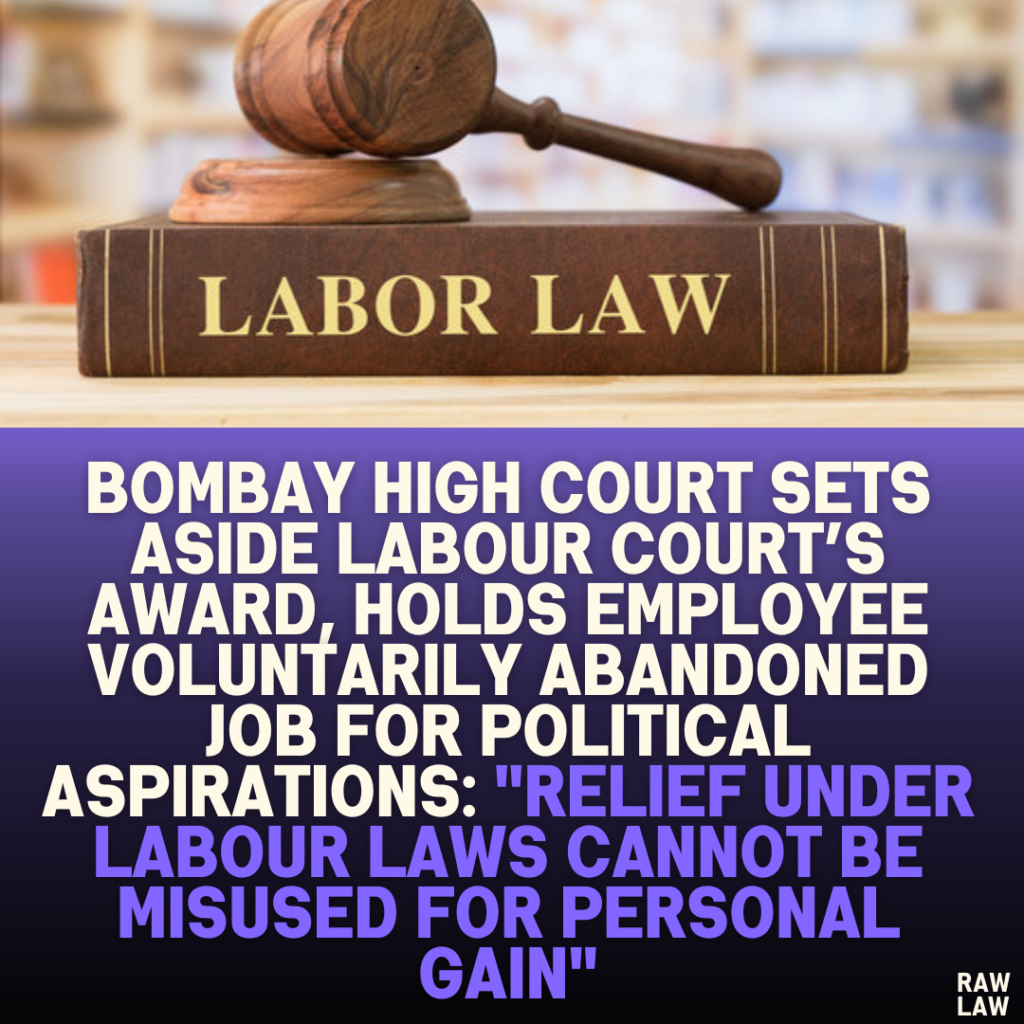Court’s Decision
The Bombay High Court overturned the Labour Court’s award granting reinstatement with 50% back wages to the respondent (a former employee). The court held that the respondent had voluntarily abandoned his job to pursue political ambitions and that his actions, including suppression of key facts and refusal to rejoin work despite multiple offers, demonstrated a lack of genuine interest in resuming employment. The High Court found the Labour Court’s decision unsustainable and set it aside.
Facts of the Case
- Employment and Termination Claim:
- The respondent was employed by the petitioner (a hotel operator) as a Supervisor-cum-Receptionist from October 2007.
- The respondent claimed his services were terminated illegally on May 15, 2014, after he requested a reduction in his excessive working hours from 16 hours to 8 hours.
- Employer’s Denial:
- The petitioner denied any termination, asserting that the respondent voluntarily left his job to contest the 2014 Lok Sabha elections from Solapur constituency.
- Labour Court Award:
- The Labour Court ruled in favor of the respondent, granting reinstatement with continuity of service and 50% back wages from May 15, 2014.
- Petitioner’s Appeal:
- The employer challenged the Labour Court’s award, arguing that the respondent abandoned his job voluntarily, suppressed material facts, and showed no interest in rejoining despite multiple offers.
Issues
- Was the respondent’s termination legal and in compliance with Section 25F of the Industrial Disputes Act, 1947?
- Did the respondent voluntarily abandon his job?
- Was the Labour Court justified in granting reinstatement and back wages?
Petitioner’s Arguments
- Voluntary Abandonment:
- The respondent left the job voluntarily to contest elections and never returned.
- Multiple reinstatement offers were extended (in 2017 and later), but the respondent did not respond.
- Suppression of Facts:
- The respondent concealed critical facts, including his participation in the 2014 and 2024 Lok Sabha elections.
- He falsely claimed termination due to a request for reduced working hours.
- Financial Position:
- During the alleged termination period, the respondent’s financial status improved. He purchased a car, owned a gun worth ₹3.5 lakhs, and had a declared annual income of ₹1.8 lakhs. This demonstrated his lack of financial dependency on the petitioner’s job.
Respondent’s Arguments
- Illegal Termination:
- The respondent argued that his services were terminated without following the mandatory procedures under Section 25F of the Industrial Disputes Act, 1947.
- He claimed to have orally applied for leave to contest elections.
- Insincere Reinstatement Offers:
- The respondent alleged that the employer’s offers for reinstatement in 2017 were insincere, as the hotel was handed over to a third party by then.
- Lack of Evidence by Petitioner:
- The respondent argued that the employer failed to provide conclusive evidence of voluntary abandonment and that the Labour Court correctly awarded reinstatement.
Analysis of the Law
The High Court examined the following legal principles:
- Section 25F of the Industrial Disputes Act, 1947:
- Requires employers to issue notice and pay compensation before terminating an employee.
- The court noted that even if procedural lapses occurred, the respondent’s conduct and intentions needed scrutiny.
- Doctrine of Voluntary Abandonment:
- The court observed that abandonment of employment could be inferred from prolonged absence without valid justification and refusal to accept reinstatement offers.
- Clean Hands Doctrine:
- The respondent’s suppression of material facts (e.g., election participation) indicated a lack of clean hands, which is essential for seeking equitable relief.
Precedent Analysis
The court relied on judgments emphasizing that:
- Employees who suppress material facts and approach courts with unclean hands are not entitled to relief.
- Voluntary abandonment of employment negates claims for reinstatement or back wages.
Court’s Reasoning
- Lack of Transparency by Respondent:
- The respondent failed to disclose his participation in the 2014 elections.
- He misrepresented facts by claiming illegal termination while knowing he had voluntarily left to contest elections.
- Improved Financial Status:
- Evidence showed that during the alleged termination period, the respondent improved his financial standing, acquiring assets like a car and a gun.
- His declared annual income indicated self-sufficiency.
- Repeated Refusal to Rejoin Work:
- The petitioner issued multiple reinstatement offers (in 2017 and through the written statement), but the respondent did not act on them.
- This demonstrated his disinterest in returning to his job.
- Labour Court’s Errors:
- The Labour Court failed to consider the respondent’s suppression of facts and refusal to rejoin work.
- It overlooked evidence showing the respondent’s lack of genuine interest in continuing employment.
- Overall Conduct of Respondent:
- The respondent’s political aspirations, financial self-sufficiency, and suppression of material facts led the court to conclude that he was misusing the Labour Court process to extract compensation.
Conclusion
The High Court set aside the Labour Court’s award, holding that:
- The respondent voluntarily abandoned his employment.
- The petitioner was not liable for reinstatement or back wages.
- Relief under labour laws cannot be misused for personal gain by individuals disinterested in resuming work.
Implications
This judgment reinforces the principle that courts must evaluate the overall conduct of claimants in labour disputes. It discourages misuse of labour laws and emphasizes transparency, integrity, and genuine intent as prerequisites for relief. The ruling serves as a precedent for cases involving allegations of voluntary abandonment and misuse of legal processes.




Pingback: Delhi High Court Enforces ₹39.75 Lakh Composition Charges on Petitioner for Delayed Construction; Criticizes Both DDA and Petitioner for Lapses, Holds Decades of Inaction Disentitle Relief Under Writ Jurisdiction - Raw Law